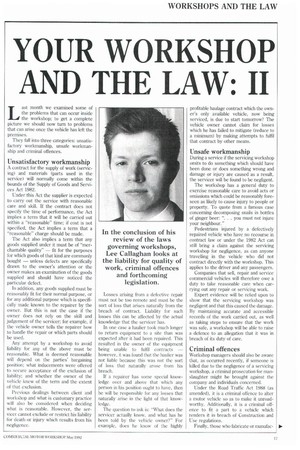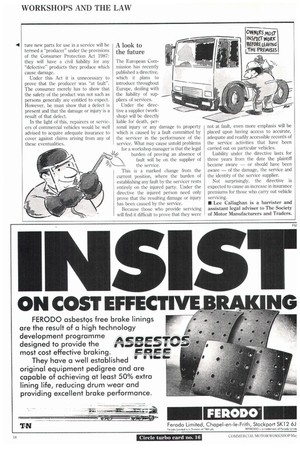YOUR WORKSHOP AND THE LAW: II
Page 109

Page 110

If you've noticed an error in this article please click here to report it so we can fix it.
IIast month we examined some of the problems that can occur inside the workshop; to get a complete picture we should now turn to problems that can arise once the vehicle has left the premises.
They fall into three categories: unsatisfactory workmanship, unsafe workmanship and criminal offences.
Unsatisfactory workmanship
A contract for the supply of work (servicing) and materials (parts used in the service) will normally come within the bounds of the Supply of Goods and Services Act 1982.
Under this Act the supplier is expected to carry out the service with reasonable care and skill. If the contract does not specify the time of performance, the Act implies a term that it will be carried out within a "reasonable" time; if cost is not specified, the Act implies a term that a "reasonable" charge should be made.
The Act also implies a term that any goods supplied under it must be of "merchantable quality" — fit for the purposes for which goods of that kind are commonly bought — unless defects are specifically drawn to the owner's attention or the owner makes an examination of the goods supplied and should have noticed the particular defect.
In addition, any goods supplied must be reasonably fit for their normal purpose, or for any additional purpose which is specifically made known to the repairer by the owner. But this is not the case if the owner does not rely on the skill and judgement of the servicer; for example, if the vehicle owner tells the repairer how to handle the repair or which parts should be used.
Any attempt by a workshop to avoid liability for any of the above must be reasonable. What is deemed reasonable will depend on the parties' bargaining position; what inducements were offered to secure acceptance of the exclusion of liability; and whether the owner of the vehicle knew of the term and the extent of that exclusion.
Previous dealings between client and workshop and what is customary practice will also be considered when deciding what is reasonable. However, the servicer cannot exclude or restrict his liability for death or injury which results from his negligence. Losses arising from a defective repair must not be too remote and must be the sort of loss that arises naturally from the breach of contract. Liability for such losses this can be affected by the actual knowledge that the servicer has.
In one case a haulier took much longer to return equipment to a site than was expected after it had been repaired. This resulted in the owner of the equipment being unable to fulfil contracts — however, it was found that the haulier was not liable because this was not the sort of loss that naturally arose from his breach.
If a repairer has some special knowledge over and above that which any person in his position ought to have, then he will be responsible for any losses that naturally arise in the light of that knowledge.
The question to ask is: "What does the servicer actually know, and what has he been told by the vehicle owner?" For example, does he know of the highly profitable haulage contract which the owner's only available vehicle, now being serviced, is due to start tomorrow? The vehicle owner cannot claim for losses which he has failed to mitigate (reduce to a minimum) by making attempts to fulfil that contract by other means.
Unsafe workmanship
During a service if the servicing workshop omits to do something which should have been done or does something wrong and damage or injury are caused as a result, the servicer will be found to be negligent.
The workshop has a general duty to exercise reasonable care to avoid acts or omissions which could be reasonably foreseen as likely to cause injury to people or property. To quote from a famous case concerning decomposing snails in bottles of ginger beer: ". . . you must not injure your neighbour."
Pedestrians injured by a defectively repaired vehicle who have no recourse in contract law or under the 1982 Act can still bring a claim against the servicing workshop for negligence, as can anyone travelling in the vehicle who did not contract directly with the workshop. This applies to the driver and any passengers.
Companies that sell, repair and service commercial vehicles will therefore owe a duty to take reasonable care when carrying out any repair or servicing work.
Expert evidence will be relied upon to show that the servicing workshop was negligent and that this caused the damage. By maintaining accurate and accessible records of the work carried out, as well as taking steps to ensure that the work was safe, a workshop will be able to raise a defence to an allegation that it was in breach of its duty of care.
Criminal offences
Workshop managers should also be aware that, as occurred recently, if someone is killed due to the negligence of a servicing workshop, a criminal prosecution for manslaughter might be brought against the company and individuals concerned.
Under the Road Traffic Act 1988 (as amended), it is a criminal offence to alter a motor vehicle so as to make it unroadworthy. Additionally, it is a criminal offence to fit a part to a vehicle which renders it in breach of Construction and Use regulations.
Finally, those who fabricate or manufac ture new parts for use in a service will be termed a "producer" under the provisions of the Consumer Protection Act 1987: they will have a civil liability for any "defective" products they produce which cause damage.
Under this Act it is unnecessary to prove that the producer was "at fault". The consumer merely has to show that the safety of the product was not such as persons generally are entitled to expect. However, he must show that a defect is present and that the damage or injury is a result of that defect.
In the light of this, repairers or servicers of commercial vehicles would be well advised to acquire adequate insurance to cover against claims arising from any of these eventualities,
A look to the future
The European Commission has recently published a directive, which it plans to introduce throughout Europe, dealing with the liability of suppliers of services.
Under the directive a supplier (workshop) will be directly liable for death, personal injury or any damage to property which is caused by a fault committed by the servicer in the performance of the service. What may cause untold problems for a workshop manager is that the legal burden of proving an absence of fault will be on the supplier of the service.
This is a marked change from the current position, where the burden of establishing any fault by the servicer rests entirely on the injured party. Under the directive the injured person need only prove that the resulting damage or injury has been caused by the service.
Because those who provide servicing will find it difficult to prove that they were
not at fault, even more emphasis will be placed upon having access to accurate, adequate and readily accessible records of the service activities that have been carried out on particular vehicles.
Liability under the directive lasts for three years from the date the plaintiff became aware — or should have been aware — of the damage, the service and the identity of the service supplier.
Not surprisingly, the directive is expected to cause an increase in insurance premiums for those who carry out vehicle servicing.
• Lee Callaghan is a barrister and assistant legal adviser to The Society of Motor Manufacturers and Traders.




















































































































